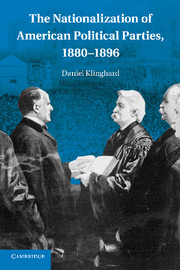Book contents
- Frontmatter
- Contents
- Preface
- Acknowledgments
- Introduction
- 1 Localism and the Jacksonian Mode
- 2 The Nineteenth-Century Associational Explosion and the Challenge to the Jacksonian Mode
- 3 Organizational Transformation and the National Parties
- 4 National Campaign Clubs and the Party-in-the-Electorate
- 5 Grover Cleveland and the Emergence of Presidential Party Leadership
- 6 Party Transformation in the Republican Party
- Conclusion
- Selected Bibliography
- Index
- References
1 - Localism and the Jacksonian Mode
Published online by Cambridge University Press: 06 July 2010
- Frontmatter
- Contents
- Preface
- Acknowledgments
- Introduction
- 1 Localism and the Jacksonian Mode
- 2 The Nineteenth-Century Associational Explosion and the Challenge to the Jacksonian Mode
- 3 Organizational Transformation and the National Parties
- 4 National Campaign Clubs and the Party-in-the-Electorate
- 5 Grover Cleveland and the Emergence of Presidential Party Leadership
- 6 Party Transformation in the Republican Party
- Conclusion
- Selected Bibliography
- Index
- References
Summary
The Jacksonian organizational mode emerged in the 1830s, as the congressional caucus method of presidential nominations was supplanted by the national nominating convention method. Along with this change came an entire organizational and cultural apparatus, including a network of institutional relationships linking local party organizations with state and national party organizations, standard assumptions about how campaigns should be conducted, and a view of partisanship and two-party competition as not only acceptable but a valuable supplement to republican political culture. This party mode passed through the realignment of the 1850s virtually unscathed. In fact, the Jacksonian party mode emerged from the ruins of the second party system stronger than before because of the Republican party's replication of the Democratic party's organizational framework. So close was its mimicry that, as explained in Chapter 6, when Republicans sought to abolish the Democrat-inspired unit rule in the 1880s, they had to specifically defend deviation from the Democrats' standard operating procedures despite the absence of a formal unit rule in the Republican party. The legitimacy of the party of Jackson's organizational structure, shaping both major party organizations, compelling broad public legitimacy, and enduring with little change over time, suggests that Martin Van Buren founded more than a single organization but an organizational mode that provided American politics with rules of appropriateness in partisan behavior that applied outside of his party.
- Type
- Chapter
- Information
- Publisher: Cambridge University PressPrint publication year: 2010



